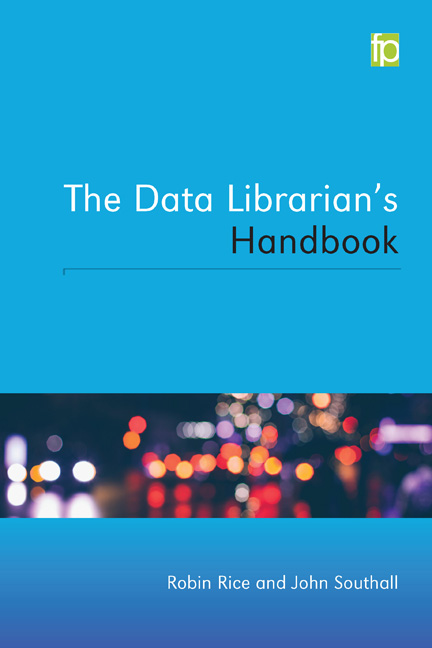Book contents
- Frontmatter
- Contents
- Acknowledgements
- Preface
- 1 Data librarianship: responding to research innovation
- 2 What is different about data?
- 3 Supporting data literacy
- 4 Building a data collection
- 5 Research data management service and policy: working across your institution
- 6 Data management plans as a calling card
- 7 Essentials of data repositories
- 8 Dealing with sensitive data
- 9 Data sharing in the disciplines
- 10 Supporting open scholarship and open science
- References
- Index
- Frontmatter
- Contents
- Acknowledgements
- Preface
- 1 Data librarianship: responding to research innovation
- 2 What is different about data?
- 3 Supporting data literacy
- 4 Building a data collection
- 5 Research data management service and policy: working across your institution
- 6 Data management plans as a calling card
- 7 Essentials of data repositories
- 8 Dealing with sensitive data
- 9 Data sharing in the disciplines
- 10 Supporting open scholarship and open science
- References
- Index
Summary
This is not the first book written about data librarianship, and hopefully it will not be the last, but it is one of very few, all written within the past few years, that reflects the growing interest in research data support. Academic data librarians help staff and students with all aspects of this peculiar class of digital information – its use, preservation and curation, and how to support researchers’ production and consumption of it in ever greater volumes, to create new knowledge.
Our aim is to offer an insider's view of data librarianship as it is today, with plenty of practical examples and advice. At times we try to link this to wider academic research agendas and scholarly communication trends past, present and future, while grounding these thoughts back in the everyday work of data librarians and other information professionals.
We would like to tell you a little bit about ourselves as the authors, but first a word about you. We have two primary groups of readers in mind for this book: library and iSchool students and their teachers, and working professionals (especially librarians) learning to deal with data. We would be honoured to have this book used as an educational resource in library and information graduate programmes, because we believe the future of data librarianship (regardless of its origins, examined in Chapter 1) lies with academic libraries, and for that to become a stronger reality it needs to be studied as a professional and academic subject. To aid the use of this book as a text for study we have provided ‘key take-away points’ and ‘reflective questions’ at the end of each chapter. These can be used by teachers for individual or group assignments, or by individuals to self-assess and reinforce what they may have learned from reading each chapter.
Equally important, we empathetically address the librarian, academic, or other working expert who feels their working life is pulling them towards data support or that area of academic activity known as research data management (RDM).
- Type
- Chapter
- Information
- The Data Librarian's Handbook , pp. xi - xivPublisher: FacetPrint publication year: 2016

